Related Research Articles
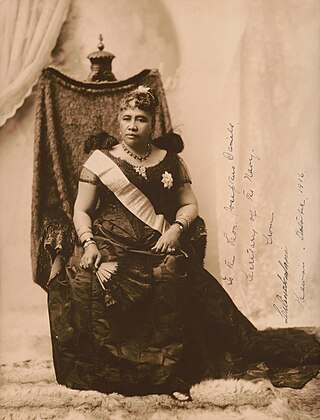
Liliʻuokalani was the only queen regnant and the last sovereign monarch of the Hawaiian Kingdom, ruling from January 29, 1891, until the overthrow of the Hawaiian Kingdom on January 17, 1893. The composer of "Aloha ʻOe" and numerous other works, she wrote her autobiography Hawaiʻi's Story by Hawaiʻi's Queen during her imprisonment following the overthrow.
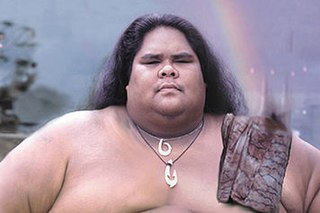
Israel Kaʻanoʻi Kamakawiwoʻole, also called Braddah IZ or just simply IZ, was a Native Hawaiian musician and singer. He achieved commercial success and popularity outside of Hawaii with his 1993 studio album, Facing Future. His medley of "Somewhere Over the Rainbow/What a Wonderful World" was released on his albums Ka ʻAnoʻi and Facing Future, and was subsequently featured in various media. The song has had 358 weeks on top of the World Digital Songs chart, making it the longest-leading number-one hit on any of the Billboard song charts. Kamakawiwoʻole is regarded as one of the greatest musicians from Hawaii and is the most successful musician from the state.

Philip Kunia Pahinui, known as Gabby Pahinui, was a slack-key guitarist and singer of Hawaiian music.

William Pitt Leleiohoku II, born Kalahoʻolewa, was a prince of the Hawaiian Kingdom and member of the reigning House of Kalākaua.
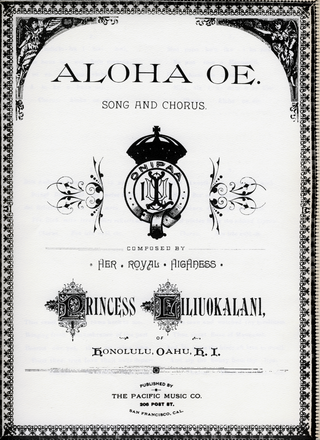
"Aloha ʻOe" is a Hawaiian folk song written c. 1878 by Liliʻuokalani, who was then Princess of the Hawaiian Kingdom. It is her most famous song and is a common cultural symbol for Hawaii.
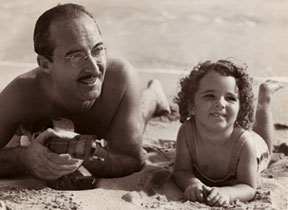
Harry Robert Owens was an American composer, bandleader and songwriter best known for his song "Sweet Leilani".
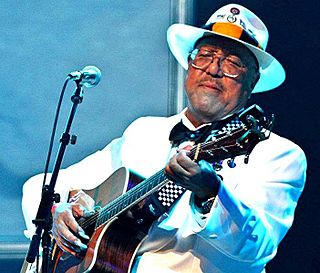
Dennis David Kahekilimamaoikalanikeha Kamakahi was a Hawaiian slack key guitarist, recording artist, music composer, and Christian minister. He was a three-time Grammy Award winner, and in 2009 he was inducted into the Hawaiian Music Hall of Fame.
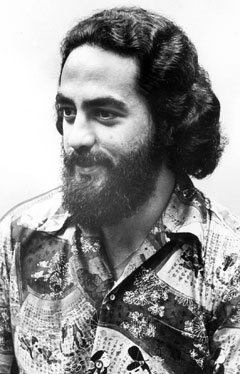
George Jarrett Helm Jr. was a Native Hawaiian activist and musician from Kalama, Molokai, Hawaii. He graduated from St. Louis High School on Oahu in 1968. While at St. Louis, he studied under Hawaiian cultural experts John Keola Lake and Kahauanu Lake. In 1975, he joined the Hui Aloha ʻĀina organization on Molokai, and participated in the formation of the Protecting Kaho'olawe'auhana organization to end the U.S. Navy's bombing of the island. In 1976, he and nine activists occupied the island. On March 7, 1977, he left for Kaho'olawe and his whereabouts are unknown.

Samuel Mānaiakalani Kamakau was a Hawaiian historian and scholar. His work appeared in local newspapers and was later compiled into books, becoming an invaluable resource on the Hawaiian people, Hawaiian culture, and Hawaiian language while they were disappearing.

Benjamin Kapena Kalama was an American singer with a honey-voiced falsetto. He is credited with discovering and nurturing Alfred Apaka, and was part of several groups. Until the day Apaka died, Kalama was coaching and arranging music for him.

"Auntie" Alice Kuʻuleialohapoʻinaʻole Kanakaoluna Nāmakelua (1892–1987) was a Hawaiian composer and performer. Nāmakelua was also a kumu hula dancer and lei-maker. She was an expert performer of the slack-key guitar and a master of the Hawaiian language. Nāmakelua was a mentor of other musicians and wrote around 180 songs of her own. She was inducted into the Hawaiian Music Hall of Fame in 2011.

Charles Edward King was an educator, Hawaii territorial legislator, and a songwriter who is most widely known as the composer of "Ke Kali Nei Au". King was inducted into the Hawaiian Music Hall of Fame in 1995. Music historian George Kanahele regarded King as the "Dean of Hawaiian Music", although this sobriquet is more associated with John Kameaaloha Almeida.

William Pūnohuʻāweoweoʻulaokalani White was a Hawaiian lawyer, sheriff, politician, and newspaper editor. He became a political statesman and orator during the final years of the Kingdom of Hawaii and the beginnings of the Territory of Hawaii. Despite being a leading Native Hawaiian politician in this era, his legacy has been largely forgotten or portrayed in a negative light, mainly because of a reliance on English-language sources to write Hawaiian history. He was known by the nickname of "Pila Aila" or "Bila Aila" for his oratory skills.

Nani Alapai was a Hawaiian soprano singer during the early 1900s. Despite not receiving any formal musical training, she was hired as a vocalist of the Royal Hawaiian Band by bandmaster Henri Berger. She became the leading prima donna of the early era of Hawaiian music through her traveling performances with the Royal Hawaiian Band in Hawaii and on the mainland United States. Recording a number of songs, she helped popularize "Aloha ʻOe" by Queen Liliʻuokalani with one of the earliest recordings of the song. She directly and indirectly influenced many later Hawaiian musicians including Lena Machado and her adoptive grandson Kahauanu Lake.

Kalani Peʻa is a three-time Grammy Award winning singer-songwriter of Hawaiian music. He released his first album, E Walea, in 2016, which won the 2017 Grammy award for Best Regional Roots Music Album. Peʻa released his second album, No 'Ane'i, in 2018, which won the Grammy Award for Best Regional Roots Music Album at the 61st Annual Grammy Awards.
Robert Edward Lin Nelson was a Hawaiian songwriter, composer, pianist, and singer. He is best known for his most popular songs, "Hanalei Moon" and "Maui Waltz". He was also a staunch defender of the copyrights and royalties of Hawaiian songwriters and composers, and served on advisory boards at ASCAP for two decades. In 2013 he received the Lifetime Achievement Award from the Hawaii Academy of Recording Arts.

The Aloha ʻĀina Party is a political party in the US state of Hawaiʻi that advocates for the Hawaiian sovereignty movement and the promotion of Native Hawaiian culture.
Victoria Keali‘ika‘apunihonua I‘i Rodrigues was a Hawaiian musician and entertainer. Born into a Native Hawaiian family with strong musical roots, Rodrigues preserved and shared traditional Hawaiian songs that might otherwise have been lost, including "Hawai‘i Aloha," "Kaulana Nā Pua," and "Paoakalani". She was honored by multiple organizations for her contributions to Hawaiian culture, including being inducted into the Hawaiian Music Hall of Fame in 1995.
Jonathan Kamakawiwoʻole Osorio is a Native Hawaiian professor of Hawaiian studies. He is the Dean of the Hawaiʻinuiākea School of Hawaiian Knowledge at the University of Hawaiʻi at Mānoa.

Puakea Nogelmeier is a kumu hula, linguist, scholar, researcher, writer and American composer of Hawaiian music and chant who is Professor Emeritus of Hawaiian Language at the University of Hawaiʻi at Mānoa and Executive Director of Awaiaulu. Nogelmeier was Professor at the Kawaihuelani Center for Hawaiian Language at the University of Hawaiʻi at Mānoa. His translation of The Epic Tale of Hiʻiakaikapoliopele won the 2008 Samuel M. Kamakau Award for books of the year.
References
- 1 2 3 Brother Noland: Award-Winning Singer/Songwriter Shares his ‘Less Talk, More Do’ Philosophy. Keola, July–August 2018.
- 1 2 Brother Noland: New CD, new band, three shows. Hawaii Tribune-Herald, December 28, 2017.
- ↑ The 25 Greatest Hawai‘i Songs of the New Century. Honolulu Magazine, October 29, 2015.
- ↑ House of Representatives, State of Hawaii (2014). "House Resolution: Recognizing Brother Noland for a lifetime achievements and his impact on island music" (PDF). Hawaii State Legislature. Retrieved August 4, 2023.
- ↑ Brother Noland. KAPA Hawaiian FM, November 15, 2017.
- ↑ "50th State of Mind" to Feature Brother Noland, John Cruz, Kalapana. KHON-TV, July 20, 2018.
- ↑ Berger, John (October 24, 2019). "Hawai'i Academy of Recording Arts honorees look back at lives of achievement". Honolulu Star-Advertiser. Retrieved August 4, 2023.
- ↑ Brother Noland’s book offers reminders of aloha spirit. Honolulu Star-Bulletin , August 21, 2005.
- ↑ Surviving With Brother Noland. Midweek, August 19, 2014.